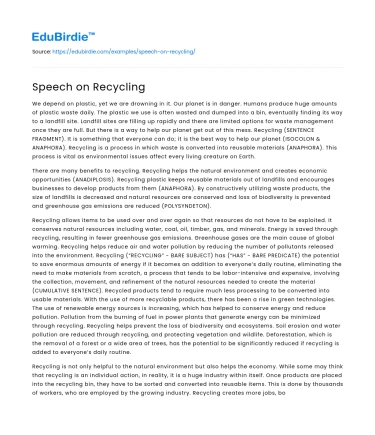We depend on plastic, yet we are drowning in it. Our planet is in danger. Humans produce huge amounts of plastic waste daily. The plastic we use is often wasted and dumped into a bin, eventually finding its way to a landfill site. Landfill sites are filling up rapidly and there are limited options for waste management once they are full. But there is a way to help our planet get out of this mess. Recycling (SENTENCE FRAGMENT). It is something that everyone can do; it is the best way to help our planet (ISOCOLON & ANAPHORA). Recycling is a process in which waste is converted into reusable materials (ANAPHORA). This process is vital as environmental issues affect every living creature on Earth.
There are many benefits to recycling. Recycling helps the natural environment and creates economic opportunities (ANADIPLOSIS). Recycling plastic keeps reusable materials out of landfills and encourages businesses to develop products from them (ANAPHORA). By constructively utilizing waste products, the size of landfills is decreased and natural resources are conserved and loss of biodiversity is prevented and greenhouse gas emissions are reduced (POLYSYNDETON).
Save your time!
We can take care of your essay
- Proper editing and formatting
- Free revision, title page, and bibliography
- Flexible prices and money-back guarantee
Recycling allows items to be used over and over again so that resources do not have to be exploited. It conserves natural resources including water, coal, oil, timber, gas, and minerals. Energy is saved through recycling, resulting in fewer greenhouse gas emissions. Greenhouse gases are the main cause of global warming. Recycling helps reduce air and water pollution by reducing the number of pollutants released into the environment. Recycling (“RECYCLING” - BARE SUBJECT) has (“HAS” - BARE PREDICATE) the potential to save enormous amounts of energy if it becomes an addition to everyone’s daily routine, eliminating the need to make materials from scratch, a process that tends to be labor-intensive and expensive, involving the collection, movement, and refinement of the natural resources needed to create the material (CUMULATIVE SENTENCE). Recycled products tend to require much less processing to be converted into usable materials. With the use of more recyclable products, there has been a rise in green technologies. The use of renewable energy sources is increasing, which has helped to conserve energy and reduce pollution. Pollution from the burning of fuel in power plants that generate energy can be minimized through recycling. Recycling helps prevent the loss of biodiversity and ecosystems. Soil erosion and water pollution are reduced through recycling, and protecting vegetation and wildlife. Deforestation, which is the removal of a forest or a wide area of trees, has the potential to be significantly reduced if recycling is added to everyone’s daily routine.
Recycling is not only helpful to the natural environment but also helps the economy. While some may think that recycling is an individual action, in reality, it is a huge industry within itself. Once products are placed into the recycling bin, they have to be sorted and converted into reusable items. This is done by thousands of workers, who are employed by the growing industry. Recycling creates more jobs, boosting the economy. The cost of maintaining the waste disposal system can be lowered if everyone participates in recycling, and the money saved can be diverted to where it is needed most.
Recycling is an act that can unite a community. Many simple programs that strengthen a community can be built upon the many benefits of recycling. In addition, recycling is one of the best ways to educate people about responsibility and taking initiative. Collective efforts in proper waste disposal will make the world cleaner and happier. Recycling is an excellent way to protect the Earth. Recycling diverts waste from landfill sites, conserves resources, saves energy, boosts the economy, and contributes to a healthy world (ANAPHORA).






 Stuck on your essay?
Stuck on your essay?

